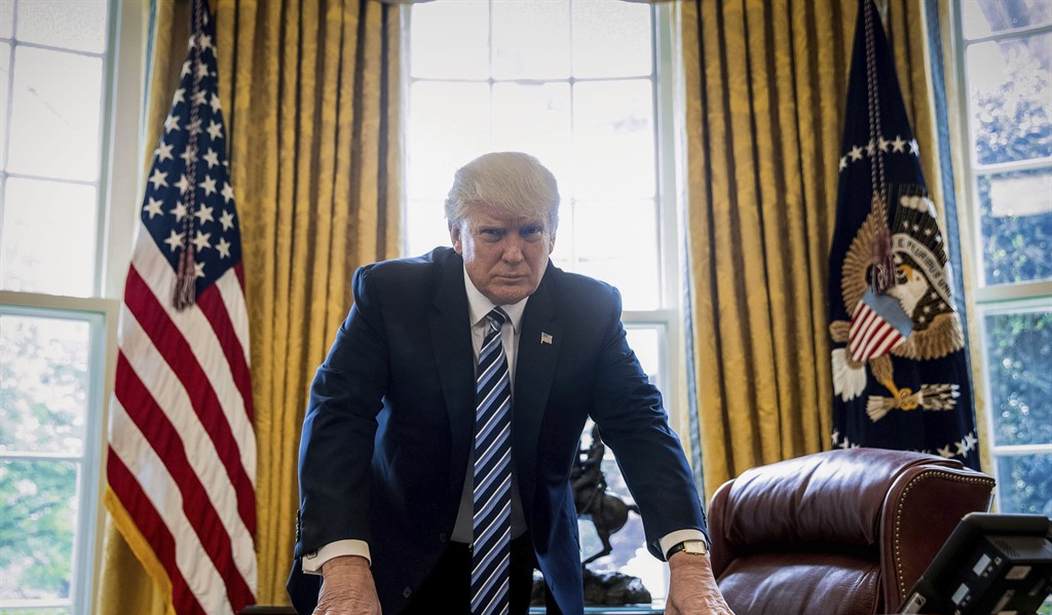Hey, Republicans believe a lot of things these days that they didn’t used to.
Is this status-quo bias or yet another “Trump effect” at work? Little of both, probably.
Republicans registered the biggest uptick in support for the deal, which has been heavily criticized by GOP lawmakers since its inception in July 2015: 53 percent of Republican voters said they supported it, compared with 37 percent who backed it last summer and just 10 percent who supported it shortly after it was announced. Democratic support for the deal has been largely unchanged since August, and a larger share of independents are getting on board, from 41 percent in August to 48 percent now.
Almost half (47 percent) of voters — and 59 percent of voters who voted for Trump in 2016 — said the administration’s decision to hold up its end of the bargain made them more likely to support the agreement…
A healthy majority (57 percent) of voters said that as long as Iran is complying with the deal, it’s in the U.S.’s national security interests to honor it, while 23 percent disagreed. Republicans (33 percent) were the most likely to say that the deal should be torn up regardless of whether Iran was complying, although half disagreed.
If it ain’t broke, don’t fix it, and the State Department certified just last week that it ain’t broke (yet). “But wait,” you say, “what about that bombshell Politico story from a few days ago exposing how the deal was even worse than Republicans feared?” Well, (a) that story came out on the 24th, the last day the Morning Consult poll was in the field, so the data didn’t capture public reaction and (b) even if the story had come out earlier, I’m guessing the effect would have been negligible. Whether a story like Politico’s penetrates the public consciousness depends on how many larger media outlets carry it. Does the media have an incentive to publicize just how terrible a deal negotiated by the Obama administration ended up being for America’s national security? No, they do not. As far as most of the public’s concerned, Iran’s keeping up its end of the bargain and the Trump White House is content, for now, to keep up its own end, and that’s that. Never mind what Rex Tillerson had to say last week.
If it’s true that all it takes now for Republicans to get onboard with a bad Democratic policy is some tepid support from the Trump White House, what’s going to happen to GOP opinion if/when Trump decides to stick with the Paris climate-change accord? Because that may happen, and some in his party are already shifting towards approval if it does:
Republicans are increasingly adopting the point of view that there isn’t much upside to walking away from the Paris accord beyond the burst of satisfaction it would give core Trump voters. Politicos who were once among the most vocal opponents of the agreement are reconsidering, as they grow concerned about the prospect of the United States removing itself from one of the most influential forums for steering global energy policy — and one that doesn’t place particularly onerous obligations on the nation.
Co-opt it, don’t crush it, is fast becoming a mantra among a broadening circle of advisors to the administration, much to the horror of the free market absolutists and anti-globalism activists who took the accord for as good as dead the day Trump was elected. The president plans to announce by the end of May what direction the administration will go.
Even Rick Perry is in the “mend it, don’t end it” camp on the accord. That’s different than the GOP change of opinion on the Iran deal, you might say, because that agreement will remain as-is whereas Trump’s advisors, Perry included, all seem to want to renegotiate the climate-change deal, at least. But Germany’s environmental minister called the idea of reworking the deal “absurd.” If international consensus is that this is a take-it-or-leave-it proposition, does Trump take it or leave it? What would Jared and Ivanka say?
In lieu of an exit question, I’ll leave you with another bit of data from a different poll, this one from Fox News. Fox asked 2016 voters if they were satisfied with their vote last year or if they wished in hindsight that they had voted differently. Both Trump and Clinton voters were practically unanimous in saying they were satisfied. For Trump the split was 97/2 and for Clinton it was 95/3. (A sign of our partisan times: In 2009, 93 percent stood by their vote for Obama while just 85 percent stood by their vote for McCain.) When Fox asked people how inclined they were to reelect Trump, though, support wasn’t nearly as intense:
Overall he’s at just 36/55 compared to a 52/31 split for Obama at this point in 2009. Not even 50 percent of Republicans say they’d definitely vote to reelect him. How does that square with the surge in support for Trump-led policies like keeping the Iran deal and boosting infrastructure spending? (I suspect Republicans have always favored infrastructure spending more than they let on during the small-government frenzy of the tea-party years. Trump’s enthusiasm for it may be less a matter of shaping right-wing opinion than giving right-wingers “permission” to voice opinions they already held.) Maybe it’s as simple as the “follow the leader” strategy being conditional. Republicans are willing to back Trump on anything he wants to do, more or less, on the assumption that he knows what he’s doing and his plan will work out. If it doesn’t, though, the backlash could be ferocious.








Join the conversation as a VIP Member